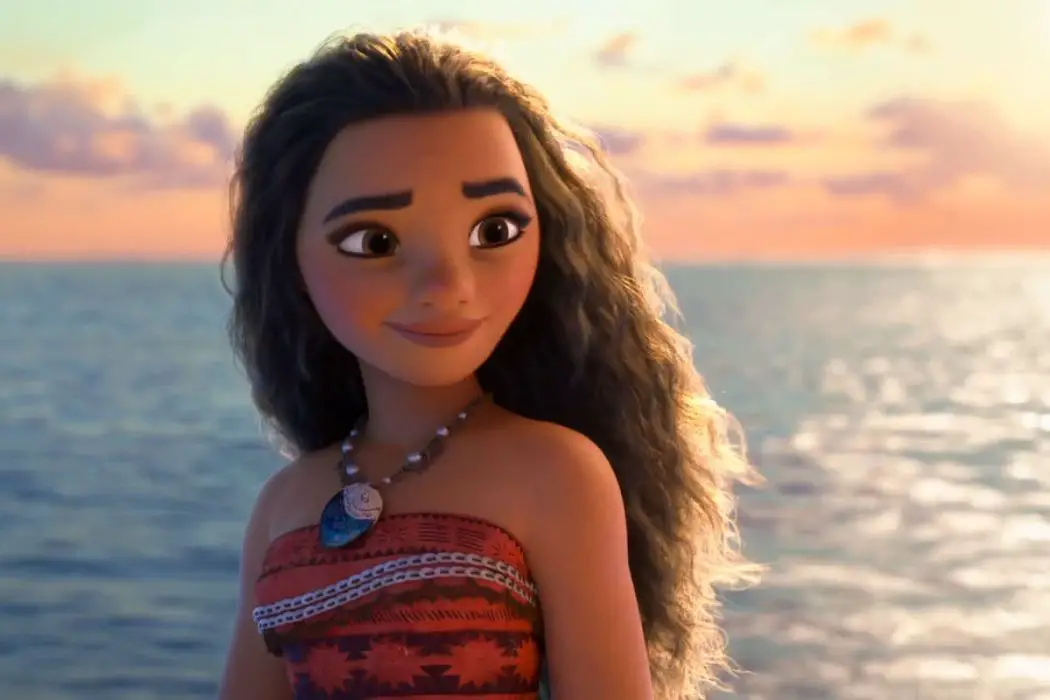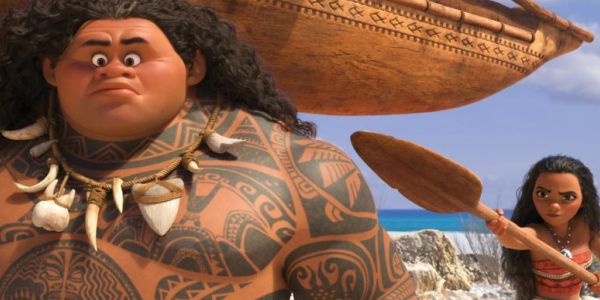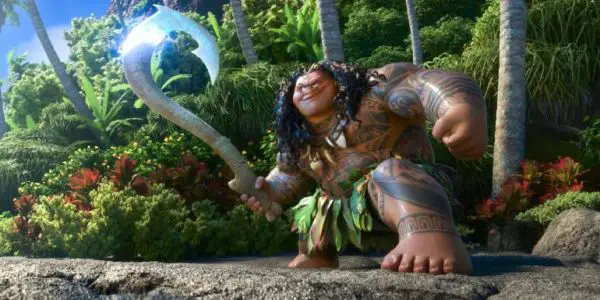MOANA: Animated By The Numbers

A bi-product of passion and experimentation gone wrong, Mike has…
Chronicling fiction is the oldest of human traditions. Not just for the sake of mere entertainment, but because life is a series of stories that we collect and store up as memories, and from the anamnesis we construct our identities and cultural milieus. Often, we retell and embellish occurrences as tales, transforming them into legends. We create lavish myths to reveal deeper truths about the human condition and connect us to the center of the universe.
Starting with the ancient oratory traditions and coming into modern times, we can see how important narratives are. Stories are all we have and form our essence, drives, and desires. But because we have handed down so many fictions, there comes a time when innovation must reinvent the familiarities. Walt Disney Studios’ Mouse House, for example, has become the most powerful studio in Hollywood as the result of being able to tap into conventional archetypes and reconstruct them for every new generation.
With their newest entry, Moana, the filmmakers have once again told the familiar story. It is the tale of a young person who has both an immense internal and physical power who has to learn to wield that force to better themselves and save their community from destruction. Of course, there are no new stories – there are only reinventions, revisions, and turns on traditions. And though Moana wades successfully into safe waters, it desperately begs to go beyond the shallow reef and overcome worn-out clichés and stagnant tropes.
Same Old Song And Dance
Moana (Auli’i Carvalho) is a Polynesian princess on the verge of shattering the glass ceiling by becoming her tribe’s first female chieftain. She’s a vivacious teenager who is constantly guided by the hopes and dreams of her lineage to the open waters, but her father, Chief Tui (Temuera Morrison), forbids her to do so. As fate would have it, their island is threatened by extinction, and it’s up to Moana to find a solution to the calamity. Her quest leads her to the demigod Maui (Dwayne Johnson), who may or may not be responsible for the bad things befalling. Together they must unite, or the darkness will spread and will consume the luscious and bountiful Pacific paradise.
Moana is a carbon copy of every other Disney princess, particularly taking her identity from Mulan, Pocahontas, and The Little Mermaid. She sings about wanting this and why can’t she do that, all against the backdrop of having an existential crisis. Naturally, Chief Tui is the typical father figure who is stuck in his ways and needs Moana to open his eyes to a better paradigm.

I think it’s a shame that co-directors Ron Clements and John Musker, who also co-directed Aladdin and The Little Mermaid, have nothing new to add to the Disney pantheon of legends when it comes to Moana and her relationship with her father. It’s as if Disney has adopted Jesus’ words about getting into heaven, as one has to humble themselves like a child to enter the Pearly Gates, and they’ve been stuck in one interpretation of it. Disney needs to branch out and add a new dynamic to these familiar and recycled narrative concepts.
Moana is a fearless go-getter, though she never once has an ounce of originality. She has flaws, but her arc is built too predictably, and the results can be seen before they are actually resolved. Maui, on the other hand, is a show-stealing narcissist. He’s c*ck-sure yet paradoxically has a frail ego. The actions he commits are to get the praise and adoration of human beings, and it is because of his own tragic past that the gods bestowed him with supernatural powers to help mankind. Dwayne Johnson gets to sing the most memorable number in the film, “You’re Welcome.” This is a shame considering Moana as the lead and the film is supposed to be all about female empowerment and overcome male shortcomings.
The songs in the film are decent to fair, not necessarily great but far from horrible. Lin-Manuel Miranda was brought in during the middle of production and his guidance was a great addition. At one one point in the film Moana and Maui have to travel to the realm of monsters and they have to fight a giant crab named Tamatoa (Jemaine Clement). The number has an off-kilter quality to it, reminiscent of The Boogeyman in The Nightmare Before Christmas. Even the score by Mark Mancia is nice and fitting, but like everything else it just does it’s job and never elevates the elements.

This gets me to the biggest aesthetic problem with Moana – the animation. It’s detailed and hyperreal to the point of not being engaging. This is Disney’s most-accurately-rendered animation, and yet it’s hit the uncanny valley. It’s too close to the real thing to be interesting and doesn’t get up the other side to making CGI humans pop onscreen. Unlike their earlier film in the year, Zootopia, which had anthropomorphic animals behaving like humans, in design and action, and were far more appealing to watch. Moana is a pretty film with pretty ideas and it plays them right at a child’s level. But the film’s simplicity juxtaposed with the life-like animation doesn’t mix well. It’s unfortunate that the filmmakers couldn’t acheive much with the story.
Way Finders Lost At Sea
Any fiction should have more going on for it than featuring a surprise ending, and vice versa, shouldn’t be docked if the audience is able to predict how the narrative will end. Moana has a meta-subtext about following in the footsteps of narrative tradition. In the song “We Know The Way,” about sailing the high-seas for fulfillment, the line goes, “We tell the stories of our elders in a never ending chain.” Similar to Kubo and the Two Strings, the thrust of the film is finding a conclusion to a story that is satisfying and that speaks to deeper truths about life. What makes Kubo more successful than Moana is in its willingness to abandon the idea of individualism and embrace the necessity of the surrounding linguistic culture. No word or meaning stands alone, yet in Moana, it comes down to just her.

The film follows the story of the past Disney animation films, but it’s a one-note piece. Yes, those early movies followed in suit of the one that came before as is the tradition of passing on fictional genetics, but there was enough internal and structural difference to them to make them stand apart. Moana has no distinction, it has plenty of will to get to the emotional heart of the tale but it’s denouement ends up being a ho-hum dud.
It isn’t that one knows the familiar beats of these characters or the predictability of their circumstances that Moana is mediocre, but that it lacks a transformation of the tropes and traditions. If these narrative ambitions were here it would subsequently and ironically reinvigorate the tropes with clever subversion and reconstruction. It would update the chain of fiction and it would be something that could reflect the film culture and inform on an aspect or two of society at large. Unfortunately, Moana lacks the creative spark and risk-taking it desperately needs. In its attempt to speak to us, what we get instead is a repetitiously banal etymological story.
Summation
Moana is sure to be a crowd-pleaser and a diverting movie for kids. Though it delivers plucky entertainment and some colorful characters, as to be expected from Disney, it plays the narrative too safely by relying on commonplace machinations without reinventing the contrivances. It’s a decent movie yet not an enduring classic, unlike its greater and more adventurous predecessors.
What is your favorite Moana song?
Moana is now out in wide-release in the US and UK
Does content like this matter to you?
Become a Member and support film journalism. Unlock access to all of Film Inquiry`s great articles. Join a community of like-minded readers who are passionate about cinema - get access to our private members Network, give back to independent filmmakers, and more.
A bi-product of passion and experimentation gone wrong, Mike has spent most of his time in the field couch surfing and growing a comb-over. Several of his favorite films are Rashomon, Vertigo, Apocalypse Now, and The Naked Gun.













